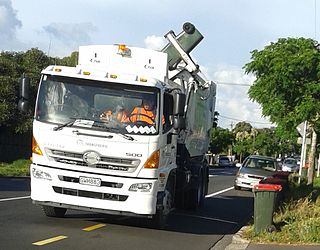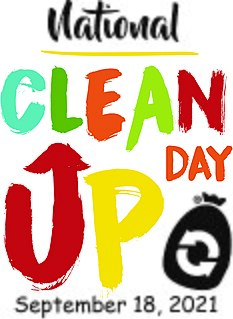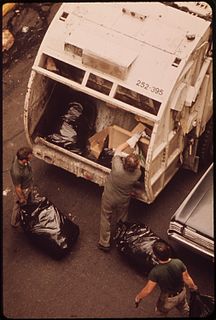Related Research Articles
Garbology is the study of modern refuse and trash as well as the use of trash cans, compactors and various types of trash can liners. As an academic discipline it was pioneered at the University of Arizona and long directed by William Rathje. The project started in 1973, originating from an idea of two students for a class project. It is a major source of information on the nature and changing patterns in modern refuse, and thereby, human society.

Litter consists of waste products that have been discarded incorrectly, without consent, at an unsuitable location. Litter can also be used as a verb; to litter means to drop and leave objects, often man-made, such as aluminum cans, paper cups, food wrappers, cardboard boxes or plastic bottles on the ground, and leave them there indefinitely or for other people to dispose of as opposed to disposing of them correctly.

Keep America Beautiful is a nonprofit organization founded in 1953 based in Stamford, Connecticut. It is the largest community improvement organization in the United States, with more than 700 state and community-based affiliate organizations and more than 1,000 partner organizations.

Marine debris, also known as marine litter, is human-created waste that has deliberately or accidentally been released in a sea or ocean. Floating oceanic debris tends to accumulate at the center of gyres and on coastlines, frequently washing aground, when it is known as beach litter or tidewrack. Deliberate disposal of wastes at sea is called ocean dumping. Naturally occurring debris, such as driftwood and drift seeds, are also present.
There is no national law in the United States that mandates recycling, and state and local governments often introduce their own recycling requirements. In 2014, the recycling/composting rate for municipal solid waste in the US was 34.6%. A number of U.S. states, including California, Connecticut, Delaware, Hawaii, Iowa, Maine, Massachusetts, Michigan, New York, Oregon, and Vermont have passed laws that establish deposits or refund values on beverage containers while other jurisdictions rely on recycling goals or landfill bans of recyclable materials.

Conococheague Mountain is a long and narrow mountain located in the far western corner of Perry County, Pennsylvania, United States. The highest point on the mountain is a summit known as Round Top which rises to an elevation of 2,190 feet (670 m) and is located at the very southern end of the ridge. The mountain is almost entirely located in the Tuscarora State Forest, and has numerous hiking trails and dirt roads, including Bryner Road, New Germantown Road, and the Iron Horse Trail. The nearest town to the mountain is Blain.

Republic Services is an American waste disposal company whose services include non-hazardous solid waste collection, waste transfer, and waste disposal, recycling, and energy services. It is the second largest provider of waste disposal in the United States after Waste Management Corporation.

Armenia is underdeveloped in its waste management and recycling activities.
Waste management in Japan today emphasizes not just the efficient and sanitary collection of waste, but also reduction in waste produced and recycling of waste when possible. This has been influenced by its history, particularly periods of significant economic expansion, as well as its geography as a mountainous country with limited space for landfills. Important forms of waste disposal include incineration, recycling and, to a smaller extent, landfills and land reclamation. Although Japan has made process since the 1990s in reducing waste produced and encouraging recycling, there is still further progress to be made in reducing reliance on incinerators and the garbage sent to landfills. Challenges also exist in the processing of electronic waste and debris left after natural disasters.

Municipal solid waste (MSW) – more commonly known as trash or garbage – consists of everyday items people use and then throw away, such as product packaging, grass clippings, furniture, clothing, bottles, food scraps and papers. In 2018, Americans generated about 292.4 million short tons (265.3 Mt) of trash. In the United States, landfills are regulated by the Environmental Protection Agency (EPA) and the states' environmental agencies. Municipal solid waste landfills (MSWLF) are required to be designed to protect the environment from contaminants that may be present in the solid waste stream.

The management of waste in New Zealand has become more regulated to reduce associated environmental issues. According to OECD data, New Zealand is the third most wasteful country in the OECD.

As a nation, Americans generate more waste than any other nation in the world, officially with 4.4 pounds (2.0 kg) of municipal solid waste (MSW) per person per day, with another study estimating 7.1 pounds (3.2 kg) per capita per day. Fifty five percent of this waste is contributed as residential garbage, while the remaining forty five percent of waste in the U.S.'s ‘waste stream' comes from manufacturing, retailing, and commercial trade in the U.S. economy. Based on proprietary data released to the public, Nevada was named America's "Most Wasteful State" for the years 2005-2010; where each resident threw away over 14 pounds of non-recycled, unreused items, often ending up into landfills and incinerators per day, eight pounds over the national state daily throwaway average. "Wasteful" states Michigan, New Mexico, Wisconsin and Oregon as well as Washington also dominated the list's 5-year period.
The San Francisco Mandatory Recycling and Composting Ordinance is a local municipal ordinance requiring all persons located in San Francisco to separate their recyclables, compostables and landfilled trash and to participate in recycling and composting programs. Passed by the San Francisco Board of Supervisors in 2009, it became the first local municipal ordinance in the United States to universally require source separation of all organic material, including food residuals.

Let's Clean Slovenia in One Day! was a Slovenian environmental volunteer project organized by the environmental organization Ecologists Without Borders on 17 April 2010. Its goal was carrying out the largest environmental act in the history of Slovenia by joining 200,000 volunteers which would remove at least 20,000 tons of municipal waste from illegal landfills in the country. Cleaning of scattered garbage in urban areas was also organized. The project was inspired by the Estonian campaign Let's Do It 2008.

Plastic pollution is the accumulation of plastic objects and particles in the Earth's environment that adversely affects wildlife, wildlife habitat, and humans. Plastics that act as pollutants are categorized by size into micro-, meso-, or macro debris. Plastics are inexpensive and durable making them very adaptable for different uses; as a result humans produce a lot of plastic. However, the chemical structure of most plastics renders them resistant to many natural processes of degradation and as a result they are slow to degrade. Together, these two factors allow large volumes of plastic to enter the environment as mismanaged waste and for it to persist in the ecosystem.
Gulf Rangers youth group was established in 2004 by the Society for the Conservation of the Red Sea Environment, an environmental non-profit, volunteer NGO located in the southern Israeli city of Eilat. The Gulf Rangers program was created to empower local youth to preserve the sea environment and prevent further damage. The program curriculum develops the teenagers' sense of social responsibility through a combination of education and activism. After training, they are ready to become environmental leaders in their home community.

Pennsylvania is a northeastern commonwealth located in the United States of America. It was one of the 13 original colonies. Pennsylvania is home to a population of 12,802,503 individuals and various different types of environments. Pennsylvania is known for its many hills, plateaus, mountains and valleys. In fact, Pennsylvania is 50 percent forest land with the only lowlands located in the southeast.

Taiwan has one of the most efficient recycling programs globally, with a 55% collection rate from households and businesses and a 77% collection rate from industrial wastes in 2019. Taiwan’s high recycling rates are unattainable in most countries due to Taiwanese geographical advantages along with efficient waste processing technologies and systems.

National CleanUp Day is held annually in the United States and globally on the third Saturday of September. In the United States, there are cleanups held in every State and Territory. It promotes country-scale organized and individual cleanup events and volunteering to keep the outdoors clean and prevent plastic from entering the ocean.

New York City's waste management system is a refuse removal system primarily run by the New York City Department of Sanitation (DSNY). The department maintains the waste collection infrastructure and hires the public and private contractors who dispose of the city's waste. This waste, created by New York City's population of more than eight million, can amount to more than ten thousand tons a day.
References
- 1 2 "Progress Report, 1997–2012". kypride.org. Personal Responsibility in a Desirable Environment. Retrieved 7 April 2013.
- ↑ "About". kypride.org. Personal Responsibility in a Desirable Environment. Retrieved 29 April 2013.
- ↑ Noble, Jeff (March 19, 2012). "Kickin' Off a Cleanup with PRIDE". Times- Tribune. Retrieved 7 April 2013.
- 1 2 3 Meadows, Mary (1 March 2013). "Locals gear up for P.R.I.D.E." Medical Leader. Retrieved 7 April 2013.
- ↑ Thornton, Hillary (March 17, 2013). "Eastern Ky. PRIDE gearing up for spring clean up". wymt tv 57 Mountain News. Retrieved 7 April 2013.
- ↑ "Lawrence County volunteers take part in PRIDE Spring Cleanup, April 16". The Big Sandy News. May 12, 2013. Retrieved 12 May 2013.
- ↑ "PRIDE kicks off recycling campaign". Appalachian News-Express. July 21, 2011. Retrieved 7 April 2013.
- ↑ "Taking PRIDE in their community". Appalachian News- Express. April 30, 2010. Retrieved 7 April 2013.
- ↑ "Take PRIDE". Appalachian News- Express. April 28, 2004. Retrieved 7 April 2013.